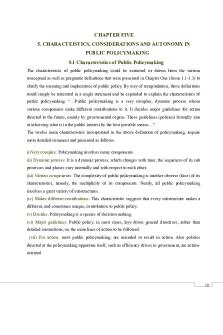Robbery (PO) - Lecture 9 PDF

| Title | Robbery (PO) - Lecture 9 |
|---|---|
| Author | Muhammad Talha Mushtaq Ghick |
| Course | Criminal law |
| Institution | University of London |
| Pages | 1 |
| File Size | 73.8 KB |
| File Type | |
| Total Downloads | 49 |
| Total Views | 127 |
Summary
Property Offence: Robbery 2013Proof of a theft is a pre-condition to liability for robbery. Hence in each potential case of robbery, consider whether there is a theft, and then consider any additional elements which may turn theft into an offence of robbery.Section 8 Theft Act 1968 provides: ‘.. per...
Description
Property Offence: Robbery 2013 Proof of a theft is a pre-condition to liability for robbery. Hence in each potential case of robbery, consider whether there is a theft, and then consider any additional elements which may turn theft into an offence of robbery. Section 8 Theft Act 1968 provides: ‘…A person is guilty of robbery if he steals, and immediately before, or at the time of doing so, and in order to do so, he uses force on any person or puts or seeks to put any person in fear of being there and then subjected to force…’ Actus Reus: 1. Theft (steals) – Robbery is theft plus. It is an aggravated form of theft, so no theft: no robbery. See: Robinson [1977] One problem may be whether or not appropriation has taken place. See: Corcoran v Anderton [1980] Another problem may be the MR of Theft. See: R v Robinson [1977] 2. Use Of Threat Of Force – This is what aggravates a theft into robbery. It is a question of fact for the jury to decide whether force has occurred. See: R v Dawson [1976] and R v Clouden [1987]. The force or threat must be used intentionally or recklessly. Accidently causing contact with V, or causing fear, is probably not robbery. See: B and R v DPP [2007] 3. On Any Person – Force or a threat used against anyone is sufficient (even though they are not the person from whom the property is stolen). 4. Immediately Before Or At The Time Of Stealing – This requirement raises questions about the duration of appropriation. If the threat or force occurs after the appropriation, D cannot be guilty of robbery. Thus it is important to decide when the theft ends. See: R v Hale [1979] and R v Lockley [1995] Mens Rea: 1. The Mens Rea of Theft and 2. And In Order To So – The force or the threat must be applied with the purpose of facilitating the theft. If the jury are satisfied that D in fact stole, yet the force or threat were not applied in order to steal, they cannot convict under S.8. However, D may be convicted of theft and, possibly, of assault. See: Donaghy & Marshall [1981]
1
Criminal Law – Year 2!...
Similar Free PDFs

Robbery (PO) - Lecture 9
- 1 Pages

Burglary (PO) - Lecture 10
- 2 Pages

Robbery: Blackmail
- 1 Pages

AK PO - PO aard
- 13 Pages

Offence of Robbery Notes
- 4 Pages

Larceny n robbery cases
- 3 Pages

MBA 1 - Lecture notes kjnopk´po+´}
- 20 Pages

PO Opracowanie
- 27 Pages

Lecture 9 - Ch. 9
- 7 Pages

Robbery in Penal Code Malaysia
- 3 Pages

Theft AND Robbery
- 3 Pages
Popular Institutions
- Tinajero National High School - Annex
- Politeknik Caltex Riau
- Yokohama City University
- SGT University
- University of Al-Qadisiyah
- Divine Word College of Vigan
- Techniek College Rotterdam
- Universidade de Santiago
- Universiti Teknologi MARA Cawangan Johor Kampus Pasir Gudang
- Poltekkes Kemenkes Yogyakarta
- Baguio City National High School
- Colegio san marcos
- preparatoria uno
- Centro de Bachillerato Tecnológico Industrial y de Servicios No. 107
- Dalian Maritime University
- Quang Trung Secondary School
- Colegio Tecnológico en Informática
- Corporación Regional de Educación Superior
- Grupo CEDVA
- Dar Al Uloom University
- Centro de Estudios Preuniversitarios de la Universidad Nacional de Ingeniería
- 上智大学
- Aakash International School, Nuna Majara
- San Felipe Neri Catholic School
- Kang Chiao International School - New Taipei City
- Misamis Occidental National High School
- Institución Educativa Escuela Normal Juan Ladrilleros
- Kolehiyo ng Pantukan
- Batanes State College
- Instituto Continental
- Sekolah Menengah Kejuruan Kesehatan Kaltara (Tarakan)
- Colegio de La Inmaculada Concepcion - Cebu




